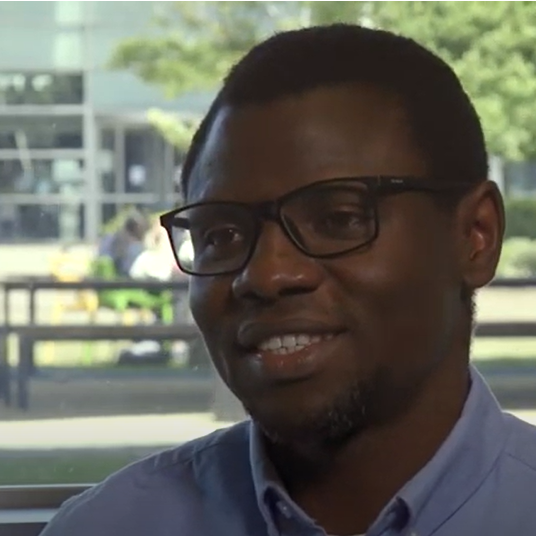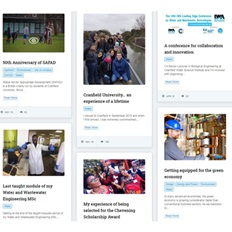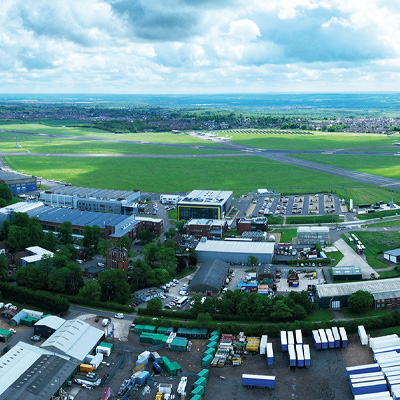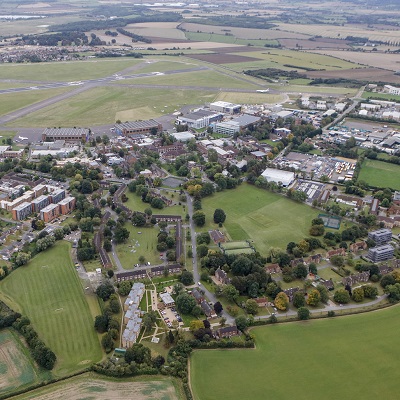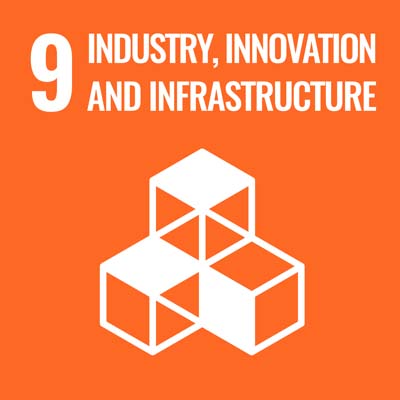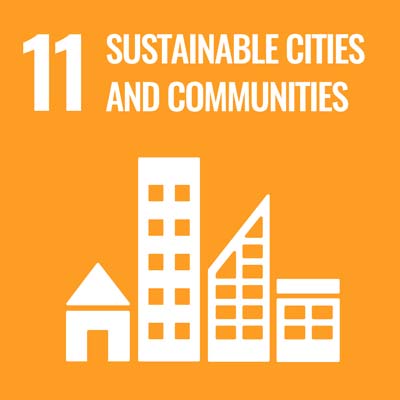Ways to meet us
Overview
- Start dateFull-time: October. Part-time: October
- DurationOne year full-time, two-three years part-time
- DeliveryTaught modules 80 credits/800 hours, Group projects 40 credits/400 hours, Individual project 60 credits/600 hours
- QualificationMSc, PgDip, PgCert
- Study typeFull-time / Part-time
- CampusCranfield campus
Who is it for?
This course is suitable for engineering, computer science, mathematics, environmental, energy and information technology graduates wishing to pursue a technical management career in the rapidly growing area of digital transformation for sustainability. It develops professional engineers, scientists and practitioners with the multidisciplinary skills and ability to analyse current and future sustainability challenges across private and public sectors.
Your career
The international nature of this growing field allows Cranfield graduates to develop diverse and rewarding global careers in industry, government or research.
Example careers:
- Energy Analyst – data science,
- Offshore Energy Analyst,
- Energy and Sustainability Analyst,
Cranfield Careers and Employability Service
Cranfield’s Career Service is dedicated to helping you meet your career aspirations. You will have access to career coaching and advice, CV development, interview practice, access to hundreds of available jobs via our Symplicity platform and opportunities to meet recruiting employers at our careers fairs. Our strong reputation and links with potential employers provide you with outstanding opportunities to secure interesting jobs and develop successful careers. Support continues after graduation and as a Cranfield alumnus, you have free life-long access to a range of career resources to help you continue your education and enhance your career.
Why this course?
Countries transitioning to net-zero face a number of challenges in different sectors of their economies. In the core of this transition, affordable and secure energy supply, sustainable development, and the digital transitions aggravate these challenges for organisations to support the government towards net-zero.
You will benefit from dedicated state-of-the-art facilities including unique engineering-scale facilities for the development of efficient technologies with low CO2 emissions. In addition to management, communication, teamwork and research skills, each student will attain at least the following learning outcomes from this degree course:- Design appropriate methods for data acquisition and processing
- Develop AI algorithms to create data-driven solutions, driving sustainability within organisations.
- Apply Data Science principles through simulation platforms and programming languages to sustainability problems.
This MSc is supported by our team of professorial thought leaders, including Professor Nazmiye Ozkan, who is influential in the field of net-zero transition and digital energy, and an integral part of this MSc.
My group project was actually with an industry, one of the leading industries in the renewable energy investment sector. So we worked with them as a consultant – so it was like working in industry, not just purely academic.
Data and data skills are really important to the energy sector as it's developing and transitioning. AI and blockchain technologies are really important to that transition but it's really important that we have the right skills and the technologies to process that data and use it accordingly.
AI blockchain in the energy sector is about that user experience. It's about taking that user centric design, place for place and understanding how we can shift that mass market and then how we can guarantee the experience that is a commercially viable for that organisation and doesn't degrade the experience that they currently have with a centralised generation system.
I think energy is one of our key challenges we face as a society. If we don't address the energy challenge, if we don't decarbonise our energy systems which make up a big chunk of our CO2 production, at the moment all else probably won't matter. Why AI and blockchain? Because I think they are two of the key technologies which are going to help us address those now there are lots of other technologies as well there are things like the Internet of Things. I think there's still a lot of work to be done on other social sciences and psychology of how to change people's behaviour because ultimately all of these technologies only make a difference if people decide to use them if people act on the advice – for example, given by an AI system – if people trust to hand over the controls to an automated system.
Informed by Industry
We have a world class reputation for our industrial-scale research and pilot-scale demonstration programmes in the energy sector. Close engagement with the energy and transport sectors over the last 20 years has produced long-standing strategic partnerships with the sectors’ most prominent players. The strategic links with industry ensures that all of the material taught on the course is relevant, timely and meets the needs of organisations operating within the energy sector. This industry-led education makes our graduates some of the most desirable in the world for energy companies to recruit.
Course details
The taught programme for the masters is generally delivered from October to February and is comprised of eight modules. Each of the first five modules are delivered over two weeks. Generally the first week involves intensive teaching while the second week has fewer teaching hours to allow time for more independent learning and completion of the assessment.
Students on the part-time programme will complete all of the modules based on a flexible schedule that will be agreed with the course director.
Course delivery
Taught modules 80 credits/800 hours, Group projects 40 credits/400 hours, Individual project 60 credits/600 hours
Group project
The group project is an applied, multidisciplinary, team-based activity. Often solving real-world, industry-based problems, you are provided with the opportunity to take responsibility for a consultancy-type project while working under academic supervision. Success is dependent on the integration of various activities and working within agreed objectives, deadlines and budgets. Transferable skills such as team work, self-reflection and clear communication are also developed.
Individual project
The individual project is the chance for you to focus on an area of particular interest to you and your future career. You will select the individual project in consultation with the Thesis Co-ordinator, your allocated supervisor and your Course Director. These projects provide you with the opportunity to demonstrate your ability to carry out independent research, think and work in an original way, contribute to knowledge, and overcome genuine challenges in the energy industry. Many of the projects are supported by external organisations.
Modules
Keeping our courses up-to-date and current requires constant innovation and change. The modules we offer reflect the needs of business and industry and the research interests of our staff and, as a result, may change or be withdrawn due to research developments, legislation changes or for a variety of other reasons. Changes may also be designed to improve the student learning experience or to respond to feedback from students, external examiners, accreditation bodies and industrial advisory panels.
To give you a taster, we have listed the compulsory and elective (where applicable) modules which are currently affiliated with this course. All modules are indicative only, and may be subject to change for your year of entry.
Course modules
Compulsory modules
All the modules in the following list need to be taken as part of this course.
Artificial Intelligence for Sustainability
| Aim |
|
|---|---|
| Syllabus |
|
| Intended learning outcomes |
On successful completion of this module you should be able to:
|
Data Analytics for Sustainability
| Aim |
|
|---|---|
| Syllabus |
Introduction to Data Analytics
Introduction to Exploratory Data Analysis, Tools Setup & Data Cleaning
Descriptive Statistics & Univariate Analysis & Visualisation
Bivariate & Multivariate Analysis & Visualisation
Statistical Testing
Optimisation
Ethics in Data Analytics
Case study
|
| Intended learning outcomes |
On successful completion of this module you should be able to: Critically analyse stages of the data analytics workflow; and establish a data analytics workflow based on the available data and formulated requirements. Identify, assess and minimise the risk related to data engineering, whilst ensuring ethical practices, data security, privacy and quality. Analyse and apply optimisation methods (including programming) to resolve problems such as energy management in the sustainability sector Critically evaluate data analysis and visualisation techniques with respect to data analytics stages, using graph analysis and visualisation techniques |
Energy Economics and Policy
| Module Leader |
|
|---|---|
| Aim |
|
| Syllabus |
|
| Intended learning outcomes |
On successful completion of this module you should be able to:
|
GIS and Spatial Data Management
| Module Leader |
|
|---|---|
| Aim |
|
| Syllabus |
Spatial data models and database structures – vectors, rasters, topology, ordered and indexed lists, hierarchical, network, relational, object oriented, hybrid, metadata. |
| Intended learning outcomes |
On successful completion of this module you should be able to:
|
Scientific Python
| Module Leader |
|
|---|---|
| Aim |
|
| Syllabus |
Fundamentals of programming. |
| Intended learning outcomes |
On successful completion of this module you should be able to: Explain how computer code is used in science and engineering. Create Python code for solving set problems and develop confidence in writing code for your own projects. Analyse data using Python libraries and visualise results as graphs, maps and interactive figures. |
Sustainability and Environmental Assessment
| Module Leader |
|
|---|---|
| Aim |
Environmental impact assessment and life cycle analysis are important tools for evaluating the sustainability of complex renewable energy technologies and industrial processes or products. The tools and concepts taught in this module will enable you to assess the sustainability of a case study from an environmental standpoint. Analysis of relevant case studies to demonstrate the assessment process, including how to account for uncertainty and sensitivity analysis. |
| Syllabus |
Environmental Impact Assessment, |
| Intended learning outcomes |
On successful completion of this module you should be able to:
|
Elective modules
One of the modules from the following list needs to be taken as part of this course.
Computational Fluid Dynamics for Renewable Energy
| Module Leader |
|
|---|---|
| Aim |
To appraise existing Computational Fluid Dynamics (CFD) techniques and tools for modelling, simulating and analysing practical engineering problems related to renewable energy, with hands on experience using commercial software packages used in industry. |
| Syllabus |
|
| Intended learning outcomes |
On successful completion of this module you should be able to:
|
Energy Entrepreneurship
| Module Leader |
|
|---|---|
| Aim |
In this world of downsizing, restructuring and technological change, notions of traditional careers and ways of creating value have all been challenged. People are depending more upon their own initiative to realise success. Never, it seems, have more people been starting their own companies than now, particularly to exploit the World Wide Web. There’s no single Government (in either the developed or the developing world), which is not paying at least lip service to enterprise development. The aim of this module is to provide you with knowledge and skills relevant for starting and managing new ventures across the entrepreneurial life cycle. Moreover, it will prepare you on how to prepare a business pitch to an investor. |
| Syllabus |
|
| Intended learning outcomes |
On successful completion of this module you should be able to:
|
Elective modules
One of the modules from the following list needs to be taken as part of this course.
Energy Systems Case Studies
| Module Leader |
|
|---|---|
| Aim |
|
| Syllabus |
Defining the scope of the case study.
Develop a project plan, aim and objectives to solve the case study problem
Multi-criteria decision analysis [MCDA] applied to energy technologies to identify the most preferred technology.
Public engagement strategies and the planning process involved in developing energy technologies
|
| Intended learning outcomes |
On successful completion of this module a student should be able to:
|
Short Research Project
| Module Leader |
|
|---|---|
| Aim |
The purpose of this module is to provide you with experience of scoping, designing and delivering of a short research project. This requires an understanding of the background literature, as well as relevant analysis techniques. You will need to agree the project scope early on and deliver the project within the two weeks of the module. The module will allow you to draw on the experience and learning from the previous modules. |
| Syllabus |
|
| Intended learning outcomes |
On successful completion of this module you should be able to:
|
Energy Economics and Policy
| Module Leader |
|
|---|---|
| Aim |
|
| Syllabus |
|
| Intended learning outcomes |
On successful completion of this module you should be able to:
|
Teaching team
You will be taught by industry-active research academics from Cranfield with an established track record, supported by visiting lecturers from industry.
Dr Pegah Mirzania is the Course Director and Dr Mennan Guder Admissions Tutor.
How to apply
Click on the ‘Apply now’ button below to start your online application.
See our Application guide for information on our application process and entry requirements.
